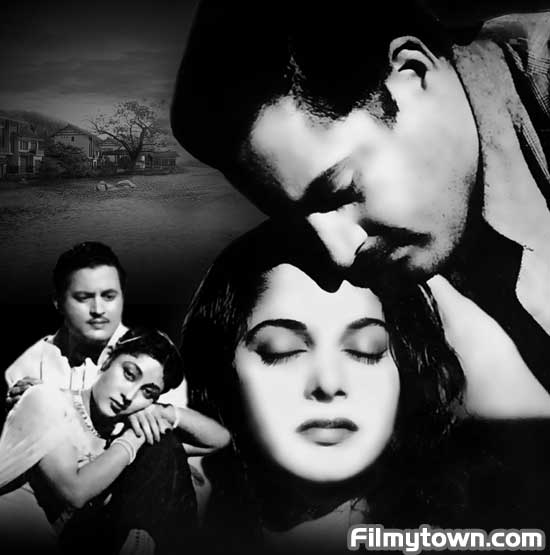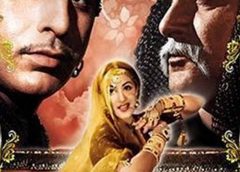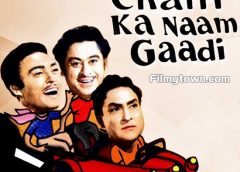The genius called Guru Dutt who created Pyaasa, was lost to the Indian film Industry at a young age when he committed suicide but not before he had a fabulous body of work to boast about, whatever may have been his reasons but there is no doubt about his craftsmanship not only in direction but also acting, which he took up upon himself when directing one of the movie his hero did not turn up.
The ‘50s and the early ‘60s was his time and Guru Dutt gave many hits not only as a director but also as an actor. Due to the tragedy of his death he is seen more related to his depressing tales of unfulfilled desires in both Pyaasa and Kagaz ke Phool. Pyaasa was close to Dutt’s heart and one of the few movies which he directed, produced and acted in. It is considered a classic and was well received by the audience too.
There is a bit of a background to the movie Pyaasa, as his team wanted to have a positive ending to the movie with the protagonist accepting a compromise but Dutt differed and stuck to his script. The movie was planned with Nargis and Madhubala but finally Mala Sinha and Waheeda Rehman played the pivotal roles. It was released on 19th February 1957.
The story begins in Kolkatta and is about Vijay (Guru Dutt) a struggling Urdu poet who wants his works published but is unsuccessful. Needled by his family members at being unsuccessful he meets a kindly prostitute Gulabo (Waheeda Rehman) who loves his poetry and also falls for him. In the meantime he meets his ex Meena (Mala Sinha), reminding of his college days, who is now married to Ghosh (Rehman) who is a big publisher. Ghosh asks Vijay to meet him at his office when they meet at a college function for his own personal interests about finding out about his wife and his affairs in college of which he has a doubt. Thinking that he might want to publish his poetry he visits Ghosh’s office but is taken aback when he shows scant interest in that and offers him a job instead and does not let any opportunity go by to humiliate Vijay and finally removes him from his employment.
Vijay comes to know from his estranged brothers that his mother is no more, giving him a major setback and he drowns himself in alcohol though supported by Gulabo he is unable to live with the barbs of the people which jibe him he run off and gives his coat to a beggar who dies in a rail mishap. As the beggar has Vijay’s coat on him, it is mistaken that Vijay is dead. Stricken at this news Gulabo takes it upon herself to publish the dead poet’s poems and meets Ghosh for the purpose, Ghosh sensing that the thorn from his life has already gone forever, he publishes the poems which become an instant hit with the public. There Vijay is recuperating in the hospital after the accident and finds out that his poems have been published but nobody is ready to believe that he is Vijay and is sent to a mental hospital by the doctors, there his friend Shyam and Ghosh also disown him. He runs off from the mental hospital with the help of his friend Sattar (Johnny Walker) and when he visits his house, his brothers who have been bought over by Ghosh also disown him. The climax is shown where people have gathered in an auditorium to pay respect to Vijay on his first death anniversary with all the usual suspects of his life sitting on the stage and Vijay sees festival of his death with his own eyes standing in the doorway of the hall where he sings the now famous ‘Ye duniya agar mil bhi jaye to kya hai’ only Gulabo is happy to see him alive, the movie finally ends with Vijay going off in the sunset with Gulabo. The people are the losers and not the poet, this is the underlying message.
Pyaasa had an underlying pathos and was depressing in most parts thus the song ‘Hum aapki ankhon mein’ was added to the track along with some comic relief from the Guru Dutt regular Johnny Walker as the masseur Sattar singing the Iconic ‘Sar jo tera chakraye’. The movie captures the deceitful opportunistic nature of humans, how they behave and change sides at the drop of a hat. The music by S.D. Burman was superb apart from the above three songs like ‘Aaj sajan mohe ang laga lo’ and ‘Jane kya tune kahi’ sung by wife Geeta Dutt and ‘Jaane who kaise log the jinke pyar ko pyar mila’ also were chartbusters. Guru Dutt had that lost look of a loser and the personality of a poet and suited the role perfectly.
Pyaasa is a sensitive movie that portrayed the depth of human emotions. A watch maybe to celebrate those Sunday blues and fine art and great music.
– Revisited by PAWAN GUPTA
(Image courtesy: IMDB)





